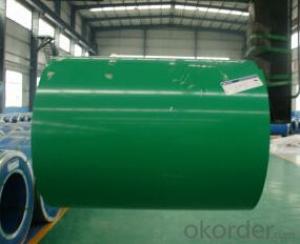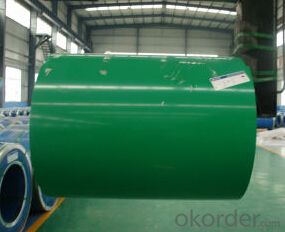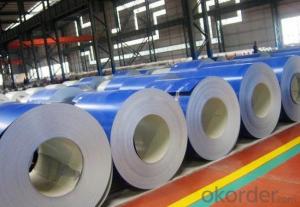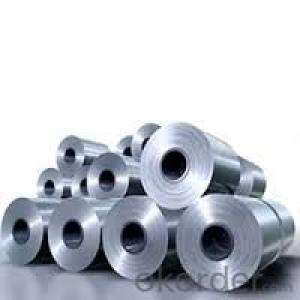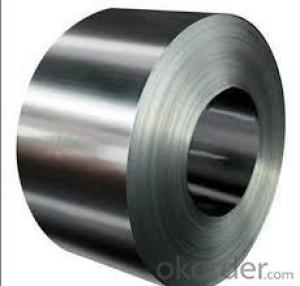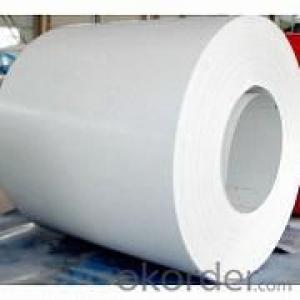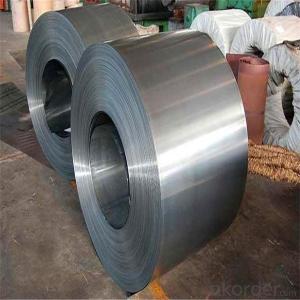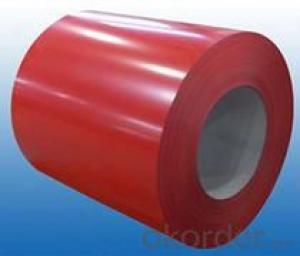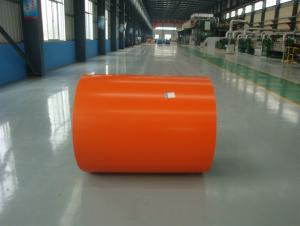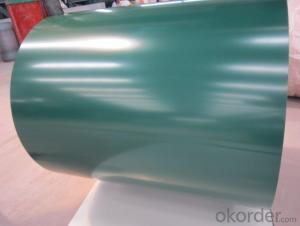Hot Rolled Color Coated Pre-Painted Steel Coil
- Loading Port:
- Shanghai
- Payment Terms:
- TT OR LC
- Min Order Qty:
- 25 m.t.
- Supply Capability:
- 10000 m.t./month
OKorder Service Pledge
OKorder Financial Service
You Might Also Like
description:
Model NO.:thickness 0.15-0.8mm
Type:Steel Plate
Technique:Cold Rolled
Certification:ISO, SGS
Standard:ASTM, GB, JIS
Stock:Stock
Surface Treatment:Coated
Special Use:Roofing
PPGI/ PPGL:Width: 610/724/820/914/1000/1200/1219/1220/1250mm
Thicness:0.13mm-0.8mm
Width:610mm-1250mm
Zinc Coating:Az40-150, Z40-275G/M2
Paint Coat:Front 5+15 Back 5-7um
ID:508mm
Spangle:Regular/Mini/Zero/Big
Surface:Chromed/Dry/Unoil or Oil/Anti-Figer
Export Markets:North America, South America, Eastern Europe, Southeast Asia, Africa, Mid East, Eastern Asia
Product Description
1.Pre-painted Galvanized corrugated steel sheet general information
1.Thickness:0.13mm to2.0mm
2.Length: 1m to 11.8m.
3. Color: navy blue,white grey and any RAL colors.
4. Certification: ISO9001:2000.
5.Material : cold rolled galvanized steel coil.
6. Standard: JIS,DX51D,SGCC,Q235.
7. advantage: waterproof,light weight, high strength,best price.
8. HS code: 7210700000
9. usage: it is used as the roofing of the house.
| Back painting: | 5-7 mic. EP |
| Color: | According to RAL standard |
| commodity | Color-coated Galvanized Steel Coil (PPGI/ PPGL) |
| Techinical Standard: | JIS G3302-1998, EN10142/10137, ASTM A653 |
| grade | TSGCC, TDX51D / TDX52D / TS250, 280GD |
| Types: | For general / drawing use |
| Thickness | 0.14-1.0mm(0.16-0.8mm is the most advantage thickness)) |
| Width | Width: 610/724/820/914/1000/1200/1219/1220/1250mm |
| Type of coating: | PE, SMP, PVDF |
| Zinc coating | Z60-150g/m2 or AZ40-100g/m2 |
| Top painting: | 5 mic. Primer + 15 mc. R. M. P. |
| ID coil | 508mm / 610mm |
| Coil weight: | 4--8MT |
| Package: | Properly packed for ocean freight exportation in 20' ' containers |
| Application: | Industrial panels, roofing and siding for painting / automobile |
| Price terms | FOB, CFR, CIF |
| Payment terms | 20%TT in advance+80% TT or irrevocable 80%L/C at sight |
| delivery time | 25 days after recepit of 20% TT |
| Remarks | Insurance is all risks |
| MTC 3.1 will be handed on with shipping documents | |
| We accept SGS certificatation test |
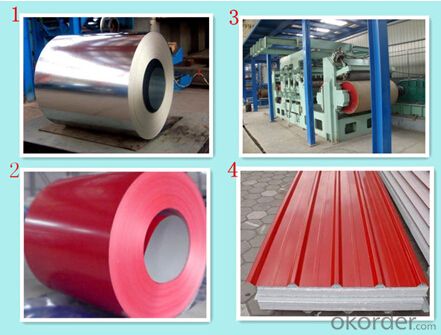
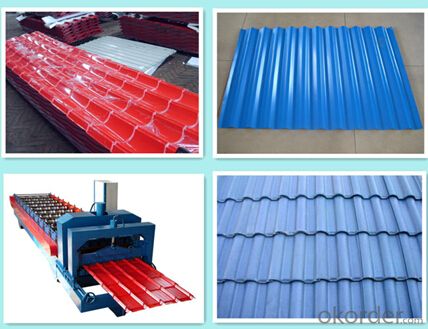
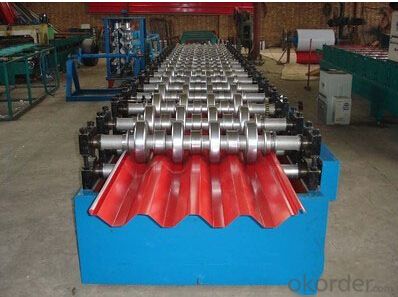
- Q: What are the different types of surface defects in steel coils?
- There are several different types of surface defects that can occur in steel coils. Some common examples include scratches, pits, scale, rust, and roll marks. Additionally, there can be issues such as waviness, edge cracks, and oil stains. These defects can affect the quality and appearance of the steel, and it is important to properly identify and address them during production and inspection processes.
- Q: I am thinking about getting a cold steel tilite or a kershaw leek or possibly a buck sirus. If you have had any experience with these knives please give it to me. thanks
- You could argue that CS makes the tougher steel, but as was pointed out, none of their wares are made in the U.S. - if that doesn't matter, then go with the CS. I started with a CS Holdout II and ended up sending it back and going with a Kershaw (Ken Onion) Blur for EDC. My next knife will be a Benchmade- they are pricey but everyone I've ever spoken to about EDC knives tell me to go to Benchmade and no one else. Not one to just listen, I had to try out a few myself. Bought the wife a Kershaw Scallion...in purple, no less.
- Q: What are the different types of steel coil loading and unloading methods?
- There are several types of steel coil loading and unloading methods, including coil cradle loading, coil trailer loading, coil car loading, coil transfer by crane, and coil transfer by forklift. Each method has its own advantages and is used based on the specific requirements and capabilities of the loading and unloading equipment.
- Q: How are steel coils used in the production of steel bolts?
- Steel coils are used in the production of steel bolts by being uncoiled and then fed into a machine that cuts and forms the bolts. The coils provide a continuous supply of high-quality steel, ensuring consistent and precise production of bolts.
- Q: What are the main characteristics of steel coils?
- The main characteristics of steel coils include their high strength and durability, flexibility, corrosion resistance, and ability to be easily formed and shaped. They are also known for their uniformity, as they are typically manufactured to precise dimensions and tolerances. Additionally, steel coils have excellent conductivity properties and are commonly used in various industries such as automotive, construction, and manufacturing.
- Q: In what ways can steel fail in use of buildings ad what can be done to prevent it?
- we fireproof steel in buildings now if thats what your talking about
- Q: How are steel coils used in the manufacturing of intake manifolds?
- Steel coils are used in the manufacturing of intake manifolds as they are typically shaped and formed into specific geometries to create the necessary channels and passages for the intake air to flow through. These coils are cut, bent, and welded to form the desired shape of the intake manifold, which plays a crucial role in directing and distributing air to the engine cylinders, ultimately optimizing combustion and improving engine performance.
- Q: How are steel coils used in the production of fireproof doors?
- Steel coils are used in the production of fireproof doors as they provide the necessary strength and durability to withstand high temperatures and prevent the spread of fire. The coils are formed into sheets or plates, which are then used to construct the framework and core of the fireproof doors. This ensures that the doors can effectively resist fire and protect buildings and occupants from its dangers.
- Q: What industries use steel coils?
- Various industries use steel coils, including automotive, construction, appliance manufacturing, transportation, packaging, and energy sectors.
- Q: what is the porpose of preheating mild steel prior to welding
- For most mild steel, it is not necessary to preheat the steel, even in thick sections. Preheating, as well as maintaining interpass temperatures is sometime used when welding high-strength or high-performance steels. This reduces the likelihood of weld cracks. Mild steel is ductile enough that weld cracks aren't usually a problem. Preheating reduces the speed at which the weld cools and solidifies. in high-strength steels, this produces a more ductile microstructure in the weld and heat affected zone, thus reducing the possibility of hot and cold cracks. This also may improve some of the mechanical properties of the H.A.Z., such as impact toughness. The slower cooling rate allows more time for hydrogen to diffuse out of the weld, reducing the potential for hydrogen embrittlement. Hydrogen is produced when water vapor reacts with the steel at high temperatures, producing iron oxide and hydrogen gas. Some steels can be damaged by even relatively small amounts of hydrogen. Electrodes used in flux core arc welding and in shielded metal arc welding often contain fluxes which tend to absorb moisture from the air. Also, rust and mill scale contain water molecules which are chemically bound to the iron atoms. Note that hydrogen embrittlement is generally not an issue with mild steel, due to it's low carbon and alloy content. Preheating also reduces shrinkage stresses, due to the slower cooling rate. This is beneficial in parts which are heavily restrained, or where distortion is a particular concern.
Send your message to us
Hot Rolled Color Coated Pre-Painted Steel Coil
- Loading Port:
- Shanghai
- Payment Terms:
- TT OR LC
- Min Order Qty:
- 25 m.t.
- Supply Capability:
- 10000 m.t./month
OKorder Service Pledge
OKorder Financial Service
Similar products
Hot products
Hot Searches
Related keywords
